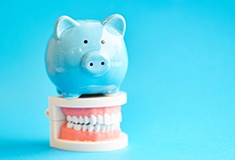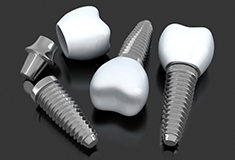
Dental Implants — Forest, VA
Replace Missing Teeth for a Lifetime
Over 100 million Americans are currently missing one or more teeth, and if this includes you, then you’re perfectly aware of the daily struggles tooth loss can cause. Daily tasks you once took for granted are now a challenge, whether it comes to speaking clearly, eating comfortably, or smiling confidently. Fortunately, at Crossroads Family Dentistry, we offer the best tooth replacement option available: dental implants. With dental implants, not only can we help you regain a smile that looks, feels, and functions just like natural, but we can replace missing teeth for a lifetime. Whether you are missing one tooth or an entire mouthful, we can rebuild your smile so you can finally live your life again. Read on to learn more, and give us a call today to schedule your consultation!
Why Choose Crossroads Family Dentistry For Dental Implants?
- Replace Any Number of Missing Teeth for a Lifetime
- Partnered with the Best Local Specialists
- Multiple Options Available to Make Dental Implants Affordable
What Are Dental Implants?

Dental implants are small titanium posts that are screw shaped. They are placed directly into the jawbone where a missing tooth once was in order to replace the lost root structure. They are the only tooth replacement option that does this, as dentures and dental bridges only replace the visible portion of the teeth above the gumline. Not only does rebuilding a missing tooth from the roots up give the new tooth an extremely sturdy base and natural look, but it also helps prevent the jawbone deterioration and sunken aged looked that naturally accompanies tooth loss. They boast a success rate of over 95%, and with the proper maintenance, they can easily last a lifetime. If you’re looking to replace your missing teeth with the next best, most natural and reliable option, there’s no better choice than dental implants!
The 4 Step Dental Implant Process

While dental implants are widely regarded as the gold standard of tooth replacement and are quickly becoming the most popular tooth loss solution, the specific details of the process are largely unknown to many people. While this highly customized treatment means that every patient’s journey towards a complete smile will look slightly different from the next, you can still expect to go through the same four basic steps. Read on to learn more about the process of getting dental implants in Forest.
Initial Dental Implant Consultation

During your consultation, you’ll get the chance to go over exactly what teeth you intend to replace, how many you’d like to replace, and which restoration we believe would best meet your needs. The planning stages of your implant treatment are vital to ensuring success. If you need to have other treatments performed in order to make implants viable (i.e. bone grafts or periodontal therapy), then the consultation will confirm this beforehand.
Keep in mind that you do not necessarily need an implant to hold every single tooth you need to replace. In most cases, about four to six implants can anchor a full-arch restoration and two implants can hold a three-crown bridge.
Dental Implant Surgery

We partner with local dental implant specialists to ensure your dental implant placement goes as smoothly and successfully as possible. Prior to surgery, you’ll be given a local anesthetic to numb any pain. During the surgery, a small incision is made in the gums so that the bone tissue underneath is exposed. Then, the implant is placed and the tissue is closed to allow for it to integrate with your jaw. Most implant surgeries are completed in a single visit, however they can take multiple hours to complete depending on the number of implants you need to place.
Dental Implant Osseointegration & Abutment Placement

Depending on where the implant was placed and several other factors, the process of osseointegration can take anywhere between three and six months to complete. Osseointegration refers to the bone tissue inside the jaw integrating with the titanium post of the implant. By the end of this process, your dental implant will have fully fused with the bone tissue to essentially become part of your jaw.
If you are getting All-On-4 implant dentures, a denture may be placed directly after your dental implant placement surgery. However, other options will not have a restoration placed until osseointegration has completed. After the bone has fully healed, we can place a small connecter called an abutment on top of the implant Then, you’ll heal for a few more weeks while your final restoration is being created.
Delivery of Dental Implant Restorations

After all oral structures have properly healed and your restoration has been fabricated, you’ll return to our office for the last step of your dental implant treatment. During this appointment, we’ll secure your custom-made crown, bridge, partial, or full denture to your dental implants via the abutments. Once we’ve checked your bite and made sure that you’re pleased with the results, we’ll go over all necessary at-home care habits you’ll need to take on. Then, you’ll be all set to go out and show off your newly rebuilt smile.
Benefits of Dental Implants

Compared to dentures or bridges, dental implants are the gold standard of tooth replacement. The Crossroads Family Dentistry team thus suggests them to anyone who wants smile restoration. After all, they’re the prosthetics that most resemble natural teeth! Still, maybe you want to learn more about the benefits of dental implants in Forest. If so, our office is happy to oblige. Here, then, are the various perks and advantages you can expect when you get implants with us. For other treatment details, feel free to call our office.
Day-to-Day Benefits

Of course, the implant benefits you’ll notice most are the day-to-day ones. Among these, the most common ones are:
- A Beautiful, Restored Smile – Thanks to their high-quality porcelain, implants are enamel-colored and blend seamlessly with your other teeth. Thus, they’ll give you a beautiful, full smile that looks natural.
- Higher Confidence – Tooth loss can easily make you feel anxious and self-conscious. With implants, though, your restored smile will strengthen your confidence and body image.
- Better Eating – Due to fusing with your jaw, implants restore more of your bite force than dentures or bridges. They also don’t slip or fall. The prosthetics, therefore, return your ability to eat your favorite foods!
- Easy Care – Implants are easy to maintain and clean, acting like natural teeth. In other words, you only need to brush them twice daily, floss them once daily, and rinse them with mouthwash as needed.
Health Benefits

In reality, implants provide health benefits that aren’t always apparent initially. Namely, they offer:
- Improved Oral Health – Since implants are easier to clean than dentures or bridges, they improve patients’ oral health and lower the risk of dental issues. Furthermore, the prosthetics help preserve your jawbone.
- Better Nutrition – As mentioned before, implants restore more of your bite force. Given that fact, they allow you to have a more varied and nutritious diet.
- No Discomfort – Unlike dentures or bridges, implants are placed in the jawbone and don’t sit on your gums. Therefore, they don’t tend to cause sensitivity or gum sores like other restorations.
Long-term Benefits

What really sets implants apart are their long-term benefits. Consider, for instance, the following:
- High Odds of Success – Implants tend to succeed in the long term. In fact, their success rate ten years after placement is over 95%!
- Long Lifespan – On average, a dental implant will last roughly 15-20 years. With proper care, however, one can have a lifespan of over 30 years.
- Cost-Effectiveness – Being both long-lasting and durable, implants very rarely need replacement. To that extent, they make a great investment that saves you money on maintenance fees. In contrast, dentures and bridges only last five to seven years and need frequent replacement and repair.
Who Dental Implants Can Help

If you are missing teeth, there’s an excellent chance that dental implants are the solution you’ve been looking for. Practically any healthy adult can get dental implants, and they’re an especially good choice for patients who are unsatisfied or frustrated with their traditional removable dentures. Whether you’re missing one tooth, several teeth, or an entire arch, we can create a personalized treatment plan to help you regain the complete smile you deserve.
Missing 1 Tooth

In the case of a single missing tooth, our dentists will use what is called an implant-retained crown to restore it. This will consist of the implant itself, a custom-made all-porcelain crown, and a metal connector called an abutment. The abutment will attach the crown to the implant, giving the tooth the same root-crown structure as the surrounding teeth. This will help it blend in completely with the smile, and it can also be trusted to be just as strong as a real tooth.
Missing Multiple Teeth

For patients missing multiple teeth in a row, implants can be used to support a bridge as well. Using dental crowns atop dental implants on either side of the gap in your smile, this single unit spans the distance and seamlessly bridges it with custom-made replacement teeth. Compared to a traditional bridge, which rely instead on healthy teeth that need to be shaved down, implant bridges look more natural, have a better hold, are healthier for your teeth, and can be expected to last longer as well.
Missing All Teeth

Do you have an uncomfortable or unreliable denture that constantly moves around in your mouth? We can use dental implants to fix this common problem. We can attach a denture to multiple dental implants to anchor it to the jawbone just like natural teeth. Compared to a traditional removable prosthetic, implant dentures are much less likely to experience slipping and sliding, the fit will last longer, and a patient will even experience a much stronger bite.
For patients who are in need of an implant denture but have inadequate jawbone density, All-On-4 may be the answer. This unique type of implant denture takes advantage of the parts of the jawbone that are naturally the thickest. With only four dental implants, a full denture can be root in place. This option often allows patients to forego necessary preliminary bone grafts, and a denture can typically be placed on the same day as dental implant placement surgery.
Understanding the Cost of Dental Implants

The cost of dental implants can vary greatly from person to person depending on their particular needs, such as how many implants they require, if any preparatory procedures are needed beforehand, and if a patient has any insurance coverage. After an initial consultation with your dentist and Jane, our Insurance & Financing Coordinator, we can give you a better idea of your overall cost as well as come up with a plan to help it fit easily into your budget.
Types of Dental Implants

There is no fixed cost of implant treatment because each patient’s smile needs are different. One of the reasons that we highly recommend dental implants is their versatility. We can use them to replace any number of missing pearly whites. For example, if you’re missing only one tooth, you can receive a single implant post topped with a realistic dental crown. On the other hand, if you don’t have any remaining teeth on either your top or bottom arch, you can get enough implants to support a full denture. Generally, the more implants you require to rebuild your smile, the more your treatment will cost.
The Stages of Dental Implant Treatment

The process of getting dental implants has several steps, and each will incur their own expenses. The first step of your implant journey will be coming into our office for a consultation with your dentist in Forest. At that appointment, we will walk you through a detailed treatment timeline and cost estimate. We will also determine whether you’ll need any preliminary procedures, such as periodontal therapy or a bone graft to strengthen your jawbone. Once we decide that you’re a good candidate for dental implants, the next step is to schedule your surgery. After your implants have been placed, you’ll spend the next several months waiting for the posts to integrate with your jawbone until they essentially become a part of your own anatomy. When this process is complete, you’ll return to our office so we can place your customized restoration.
Are Dental Implants Worth the Investment?

While it’s true that dental implants tend to cost more upfront than other methods of tooth replacement, the benefits they offer make the price tag more than worth it. Because implants have the potential to last a lifetime, you may actually end up saving money in the long run, since you won’t have to get your implants replaced every few years like you would a traditional bridge or denture. In addition to their longevity, dental implants are the only solution to tooth loss that prevents the jawbone deterioration that occurs as a consequence of missing teeth. This can help you save on cosmetic treatments down the road because it will keep your face looking young for much longer.
Does My Dental Insurance Cover Dental Implants?

Unfortunately, most dental insurance carriers don’t cover the cost of dental implants in Forest. However, by scheduling a consultation with our kind and helpful team, we can assist you in maximizing your benefits and minimizing the amount you’ll have to pay out of pocket. In fact, we may discover that your insurance pays for certain portions of your treatment, such as preliminary procedures or your restoration. We also have financing options like CareCredit available to help you finance your dental care with very little interest.
Dental Implant Failure & Salvage

Dental implants have an incredibly high success rate of 95%. However, there is still a rare chance of having dental implant failure. If your restored smile begins to feel uncomfortable or you have concerns regarding your dental implants, give us a call. We may be able to restore your smile with dental implant salvage treatment!
Learn More About Dental implant Failure and Salvage
Dental Implant FAQs

If you’re considering dental implants in Forest, you’re on the right track to having a restored smile that looks great and feels natural. But unless you’ve had implants before, you probably have a few questions. Below, you’ll find the answers to the dental implant FAQs we hear the most. But don’t hesitate to contact us with any other questions!
How Long Does It Take to Recover From Dental Implant Surgery?
After your implant has been placed, you’ll have moderate swelling and tenderness in the area, but it’s usually well-managed with over-the-counter pain medication. The entire recovery process usually takes about a week, but most people only need to take 2-3 days off work (you can also simply schedule your procedure on a Thursday or Friday to give yourself the weekend to recover).
Do I Need a Bone Graft to Get Dental Implants?
Just like the roots of natural teeth, dental implants need to have strong, healthy jawbone surrounding them for support. However, after the teeth are extracted, the jawbone begins to deteriorate.
If it’s been several years since someone lost their teeth or if they have advanced gum disease, they may have lost too much jawbone to be a candidate for dental implants. In these cases, we often recommend a bone graft to strengthen and fortify the jaw by adding extra bone. To determine if you need this procedure, we’ll take detailed images to assess the health of your jaws during your consultation.
Are Dental Implants Safe?
Dental implants are very safe. In fact, they’ve been successfully used for millions of people over the last several decades now. And they’re made of bio-compatible surgical-grade titanium, which is the same material that’s used in knee and hip replacements.
Are Dental Implants Covered By Dental Insurance?
Insurance plans vary quite a bit, so a good place to start is looking at your individual benefits. And since we accept so many different plans, you can also call us and we’ll be happy to explain your coverage. Having said that, most insurance companies only cover the lowest-cost treatments (such as bridges and dentures), even if that’s not the ideal option for you.
However, it’s worth noting that your insurance could offer partial coverage for some parts of the implant process. This includes exams, X-rays, and even the restoration that’s used to complete the implant (e.g. the dental crown, bridge, or denture).
Maintaining & Caring for Your Dental Implants

Dental implants can last for more than three decades or even the rest of your life. However, it’s essential that you take all of the proper steps to care for them. If you aren’t taking the time to protect your dental implants from becoming damaged, they could end up failing and needing to be replaced with a new implant or another tooth replacement option. The good news is that with a few simple precautions, you can enjoy the benefits of your implants for many years down the road.
Make Oral Hygiene a Priority

Dental implants can’t get cavities themselves, but you still need to practice excellent oral hygiene. In addition to keeping your surrounding teeth in good shape, sticking to a great oral hygiene routine can prevent other dental problems, like gum disease that can cause your implants to fail. Remember to brush, floss, and rinse with mouthwash every day.
Eat a Healthy Diet

One of the many benefits of dental implants is that you won’t need to deal with any eating restrictions. You can easily enjoy a nutritious meal without struggling to chew. Just remember that having too many items that are hard, sticky, or sugary can be problematic for your oral health. Instead, eat foods that have plenty of calcium and vitamin C to keep your jawbone and gums in good shape.
Break Bad Habits

Bad habits can cause your dental implants to fail over time. Refrain from smoking or using tobacco products immediately after your procedure, as they can slow down healing and increase your risk of developing an infection. Don’t use your teeth as tools either, as you could accidentally end up damaging your dental implants or the surrounding teeth. Instead, find scissors, a bottle opener, or another tool that can help you complete your task safely.
Protect Your Dental Implants

Your dental implants are very strong, but they aren’t indestructible. You should always wear a mouthguard to protect your dental implants and natural teeth when you participate in sports. If you grind your teeth at night, ask about a nightguard to protect your implants from additional wear and tear.
Schedule Regular Dental Checkups

You should attend regular cleanings and checkups every six months. This way, we can monitor your dental implants and spot any issues as early as possible. By catching potential problems now, you can prevent them from becoming more serious and leading to additional consequences, like dental implant failure.
Preventive Dentistry Restorative Dentistry Dental Implants View Our Services